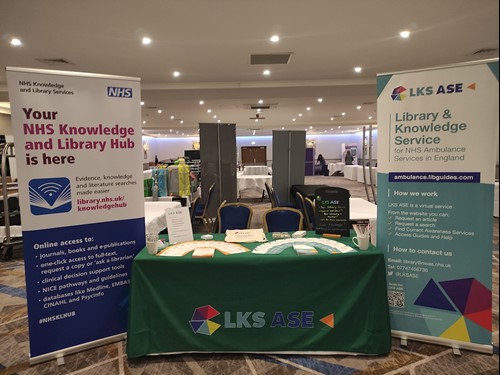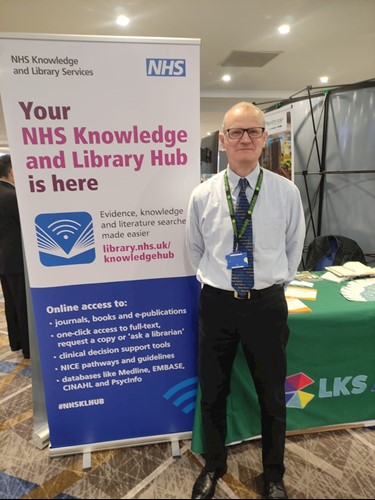I recently attended the Ambulance Leadership Forum event as an Exhibitor, the first in person event since COVID19 wiped the calendar clean. Pre COVID, LKS ASE exhibited at many events and occasionally presented as well. Being an Exhibitor is a unique experience, essentially waiting in a hall, ante room or dining room for Delegates to come out for their breaks and meals and hopefully engage you in conversation. Typically, Exhibitors represent publisher's, lifesaving equipment suppliers, professional organisations and medical goods suppliers. There is plenty of time to reflect (and work) between the breaks, one of those reflections was what does it take to be a good Exhibitor. So, here are my top ten tips.
- Set up early – Most conferences allow you to set up the night before and it’s a good idea to do that. There are a couple of reasons. It annoys the conference organisers if you are still setting up when the delegates arrive for registration. Its stressful for you as an exhibitor and you may miss some early interaction with delegates because you weren't The best choice all round is to roll in just before the delegates and take your seat – if you remembered to order one – behind you're already completed stall.
- Plan your day(s) - Don’t confuse being an Exhibitor with being a Delegate. Exhibitor is a real job, and you don’t have to attend all the sessions as well. However, there might be a unique opportunity to hear someone speak on a topic of interest. So, I attended the Keynote Session and the breakout sessions by people I knew. If you do too much you end up being frazzled and missing your quality time as you race back to your stand to beat the delegates.
- Work the room – During the downtime between delegate breaks go round and visit all the stands. Take some business cards and freebies with you. It will be interesting, and Exhibitors love to talk. It can fill in background information for future enquiries and there are always connections to be made. Just as for instance on a medical stand they were handing out an article from BMJ Open. I realised that it would qualify to go on our repository amber and was able to do a bit of promotion for our services. You can also take the opportunity to collect their freebies which may be better than yours.
- Don’t sit down in the breaks - During the breaks people will flow round the hall/venue. You won’t always get the choice of stand location, but you need to put yourself in harm's way. So, loitering in front of your stand gives you a better chance of engaging people in conversation. In any venue the library is going to be a hard sell, so you need to put in that extra effort and be quick to draw people into conversation.
- Don’t ration the freebies – I sometimes wonder if there is an unofficial market in freebies, pens, notebooks etc. I confess to collecting a few notebooks as I use them a lot and well it's nice to have your College of Paramedics notebook or whatever it is that takes your fancy. So, if someone shows an interest give them everything and leave plenty of stuff on your stand when it's not attended. The role of the freebies is to get your name and logo out there and if you go home with nothing you have done a good job. Despite your fears you will never run out (usually).
- Take contact details and follow up - It speaks for itself really but make sure you get a name and eMail address from anyone that speaks to you and follow up after the event. People really appreciate this especially if you do a search or answer some enquiry. Making a note so that you can personalise your eMail is also a good idea.
- Leave nothing but cake crumbs - This relates to 5. above but I always try to find a home for anything I have left over. As a national service we often send out materials by post but if we are hosted by a local service or they have a presence at the exhibition I always offer to leave materials to be handed out at inductions or other training sessions.
- On practicalities - At some point in my travels I usually use public transport, so my rule of thumb is if I have more material than I can reasonably get on a bus or train then it's too much. For big conferences you will get the opportunity to courier your material in advance but if you are taking it with you for smaller events then you must be realistic. So as a fit and strong person I have one small, wheeled suitcase and one or two stands. I always take the Knowledge and Libraries Hub stand and maybe my library stand or one advertising amber depending on the conference topic. This plus a laptop case which with a bit of skill I can balance on top of the suitcase.
- Always read the conference handbook – You would think that just turning up would be enough, but the organisers may want logos, abstracts and bios for conference publicity. You need to be insured by your trust, and there will be many more items on the checklist. Most important of all is what you get with your stand. You may just get a space which will leave you without chairs, tables or a power point for your laptop. So, to avoid embarrassment and standing up for 12 hours make sure you get the basics. These are usually hired for the duration of the conference from a nominated supplier.
- Your exhibition kit – over many events I have refined my Exhibitors kit. It now consists of a tablecloth with the library logo – very colourful. Two mugs that hold pens and pencils. A tabletop blackboard and set of board pens. A bowl for sweets – usually Haribos. Leaflets, which are essential and freebies, currently pens, pencils, post Its and notebooks. More creative colleagues – which I am not – might add some more items to the list. I once got tired of the Blackboard message which was a bit worthy and wordy and just wrote FREE INFORMATION which got an incredibly positive response!

Matt Holland,
Library Manager, LKS ASE,
[ Matt.Holland@nwas.nhs.uk ]


